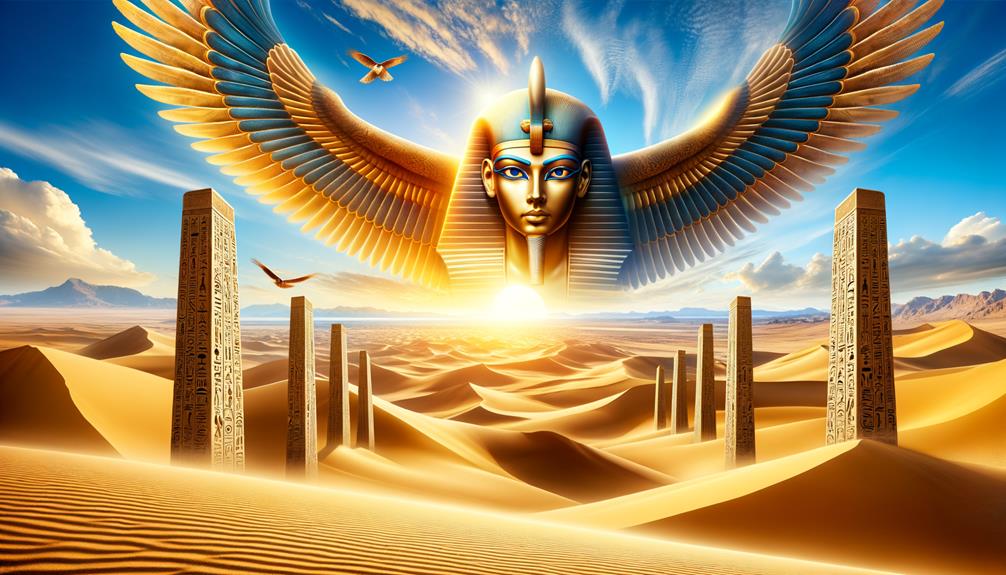Let's talk about the ancient Egyptian Sky God, Horus. The term 'Horus' has its roots in the Egyptian word 'her,' which implies something that is 'high' or 'above.' But, Horus is not just a regular sky god. He is the child of Osiris and Isis, carrying with him the power of the cosmos. His eyes are symbols of the sun and the moon, reflecting the idea of divine order.
In the past, Pharaohs regarded themselves as living representations of Horus, often using his name in their royal titles as a mark of honor. The Eye of Horus, a significant symbol in ancient Egyptian culture, stood for protection, healing, and the divine right of a king.
It's interesting to note that the influence of Horus extends beyond Egyptian culture. There are traces of his symbolism even in Christian iconography. If you dig a little deeper into Horus's mythology, you'll find that it's an intricate tapestry of ancient Egyptian beliefs and narratives.
Horus: A Detailed Etymology
If you look closely at the history of 'Horus,' you'd realize that his name comes from the old Egyptian term 'her,' which translates to 'high' or 'above.' This perfectly captures his rule over the sun and the moon. Known as the sky god, Horus held a special place in the hearts of the ancient Egyptians, his eyes being symbols of the sun and the moon—the celestial bodies that controlled the day and night.
The right eye of Horus, which stood for the sun or the morning star, was widely recognized as a symbol of protection and power. On the other hand, his left eye, which represented the moon or the evening star, was linked to healing and restoration, showcasing his diverse nature. Being the child of Osiris, another respected Egyptian god, Horus was admired for his strong influence and might.
The importance of Horus escalated when he joined forces with the sun god, Ra, to become Ra-Horakhty. This union not only highlighted his links to the sun but also marked his high standing in the ancient Egyptian universe. This is how Horus, the 'high' or 'above', shows us the reverence and respect the ancient Egyptians had for the stars and planets.
The Role of Horus in Pharaohs Life
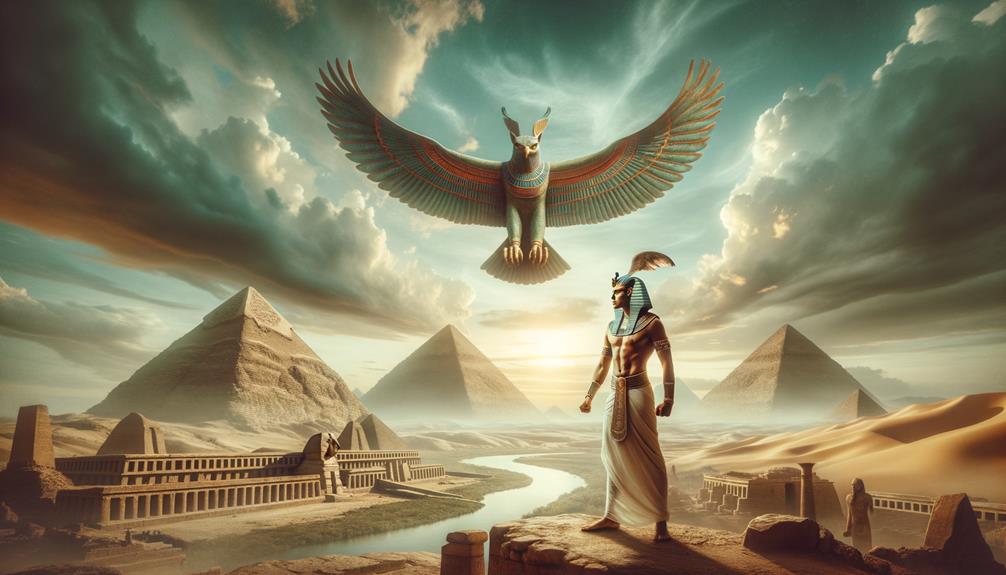
Back in ancient Egypt, pharaohs saw themselves as living versions of Horus, the god of the sky. This wasn't just a belief, but a deep-rooted idea that defined who they were as rulers. Being Horus gave the pharaohs a sense of divine power, which they used to keep everything balanced and orderly. Their role as a god-king wasn't just a stamp of approval, it was a core part of their rule.
They went by the 'Horus name', a key part of their royal title that continually reminded them of their god-like status. They didn't just pray to Horus, they were a part of him. This link gave them a sense of legitimacy, a divine mandate to be in charge. This was evident in the monuments they built and the temples they dedicated to Horus.
Every stone, every piece of writing, every custom was a nod to their relationship with Horus. These tangible expressions weren't just for them, but also to remind their people of the divine nature of their kingship. It gave their rule a foundation that was more than just a birthright, it was a command from the gods.
Exploring the Origin Mythology of Horus
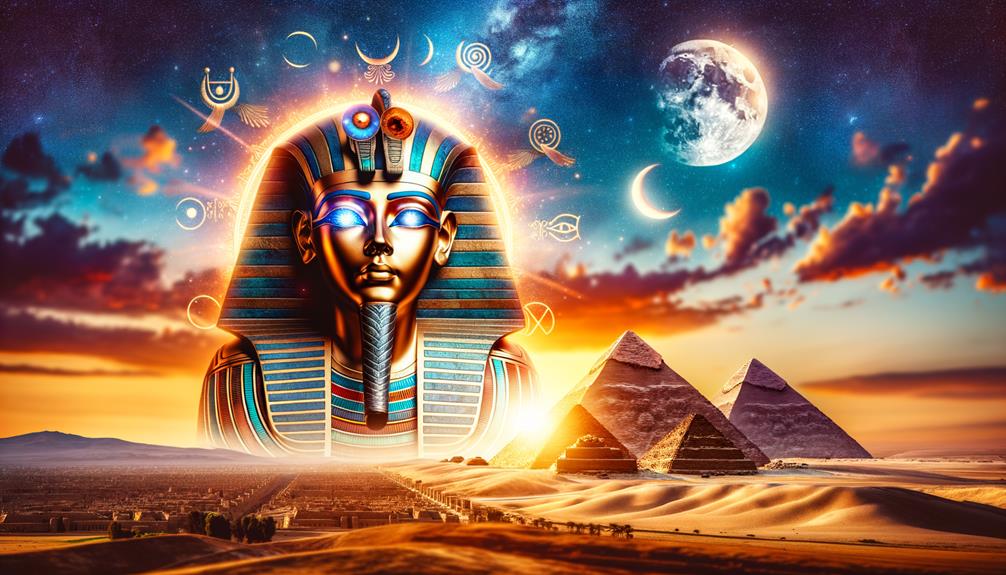
Let's take a closer look at how the mythology of Horus, the sky god, shaped ancient Egypt. The connection between the pharaohs and Horus wasn't just symbolic; it went way beyond that. The story of this falcon-headed god is tied up with the very belief system of ancient Egypt, particularly the ideas of royal authority and safeguarding.
The tale of Horus is an integral part of the Osiris myth. He's the son of Osiris and Isis and stands for the renewal and perpetuation of the divine order. When his father Osiris was killed by his uncle Seth, Horus stepped up to the plate. He sought justice for his father's death and took on Seth, who represented the forces of disorder threatening the religious fabric of ancient Egypt. This epic clash between Horus and Seth encapsulates the timeless battle between order and chaos, a recurring motif that had a profound impact on the culture of ancient Egypt.
When Horus emerged victorious from this cosmic clash, he symbolized the triumph of order over disorder. In doing so, he cemented his status as a powerful symbol of both kingship and protection. His link to the Eye of Horus, a revered symbol of healing, further underlined his role as a protective deity. By delving into the mythology of Horus, we can better appreciate his pivotal role in shaping the spiritual ethos of ancient Egypt.
Symbolism Behind the Eye of Horus
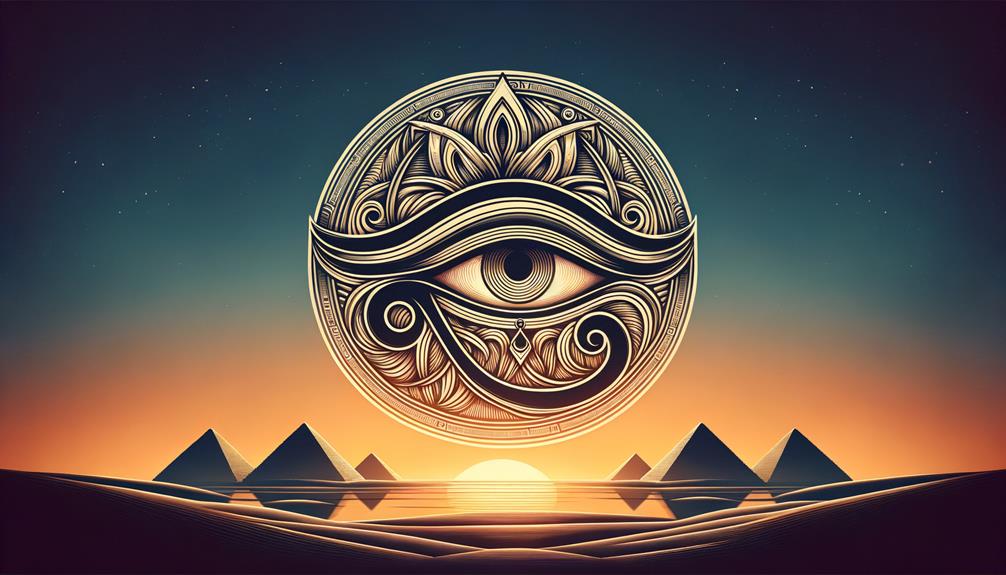
Let's take a moment to chat about the Eye of Horus, an ancient symbol of protection and healing deeply valued in the Egyptian culture. This intriguing emblem, frequently seen in Egyptian antiquities, has its roots in the legend of Horus, the child of Osiris and Isis.
There's an interesting story behind the Eye of Horus. When Osiris was killed out of spite by Seth, Horus went to war with him to take back the throne. During this clash, Horus lost his eye, but Thoth, the deity of wisdom, healed it. This healed eye, known as the 'Wedjat', turned into a powerful emblem of safeguarding and recovery.
Based on this tale, the Eye of Horus encapsulates three vital elements:
- The fragments of the Eye stand for mathematical fractions and human senses, denoting the concepts of wholeness and completeness.
- The connection to the Sun emphasizes the Eye as a symbol of royal power and divinity, given that the eye of the Egyptian deity Horus was the Sun itself.
- The healing power of the Eye reflects the ancient Egyptians' faith in restoration and the victory of good over evil.
These deep-seated symbolic meanings still hold relevance and significance, making the Eye of Horus a key element of ancient Egyptian culture.
Horus Influence on Christian Iconography
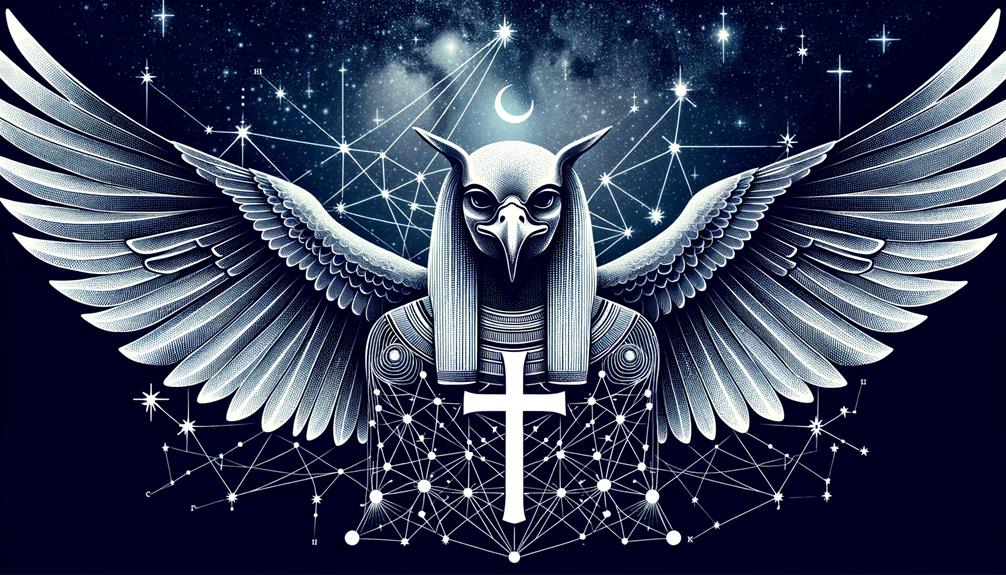
When you take a close look at Christian iconography, you might be surprised by the number of symbols and stories that resemble those linked to Horus, the sky deity from ancient Egypt. Take, for example, the eye symbol associated with Horus, which seems to have found a place in Christian imagery.
The story of Jesus' birth, marked by divine presence and miraculous events, carries hints of Horus' own birth story. We see potential influences here. Similarly, the idea of salvation, where both Jesus and Horus are portrayed as divine figures conquering evil, shows parallels.
Symbols like the ankh and the cross, which essentially stand for life and resurrection, suggest there may have been some cultural exchange between old Egypt and early Christianity. The Eye of Horus, standing for protection and healing, could have sparked similar themes in Christian iconography.
Let's break it down using a table for better understanding:
| Symbol | Horus vs Christian Iconography |
|---|---|
| Falcon-head | Horus, the falcon-headed deity vs Holy Spirit often depicted as a bird |
| Eye Symbol | Eye of Horus vs All-Seeing Eye of God |
| Birth Story | Divine birth of Horus vs Virgin birth of Jesus |
| Salvation | Horus's victory over Set vs Jesus's resurrection |
| Ankh/Cross | Ankh, symbol of life in Egypt vs Cross, symbol of resurrection in Christianity |
Frequently Asked Questions
Is Horus the God of the Sky?
Absolutely, Horus is indeed known as the sky god. You can see this in his representation as a high-flying falcon, which is a testament to his celestial command. This really shows how much respect the ancient Egyptians had for the sky.
Who Is the Egyptian Deity of the Sky?
Did you know that in the rich tapestry of Egyptian mythology, the sky is represented by a specific deity? Often visualized as a falcon, or as a man with the head of a falcon, this divine figure is a crucial player in keeping the universe balanced and peaceful. This god's role is no small task, and his significance in the mythological narratives is profound.
Who Is Horus the God of Air?
Some may believe that Horus is the god of air, but actually, this isn't wholly accurate. In the mythology of ancient Egypt, Horus is recognised as the god of the sky, not just the air. His influence extends further to include kingship and protection. So, Horus's jurisdiction isn't limited to the air; it's much wider than that.
What Does the Egyptian God Horus Represent?
In the ancient Egyptian world, Horus stands as a symbol of royalty, the vastness of the sky, and the comfort of protection. He's often brought to life in images as a god with the head of a falcon, a clear nod to his divine right to rule. Stories depict him as the courageous son of Isis and Osiris, locked in combat with Seth. This eternal struggle paints a picture of the ongoing fight between order and chaos.

